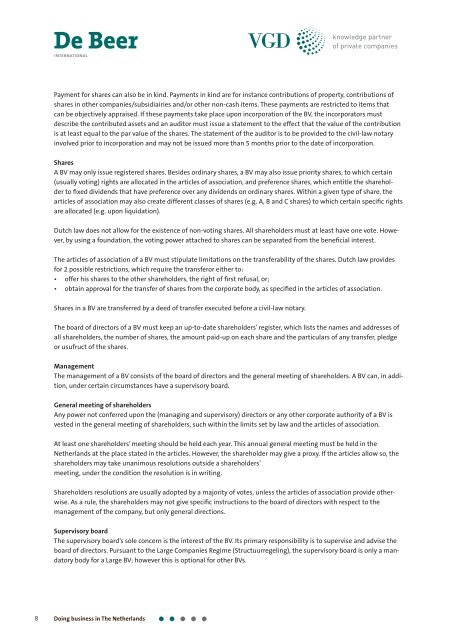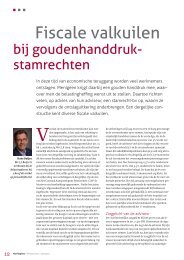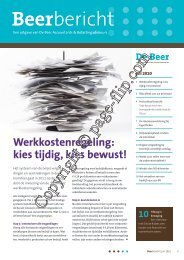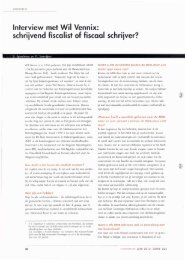De Beer
De Beer
De Beer
- No tags were found...
Create successful ePaper yourself
Turn your PDF publications into a flip-book with our unique Google optimized e-Paper software.
<strong>De</strong> <strong>Beer</strong>INTERNATIONALknowledge partnerof private companiesPayment for shares can also be in kind. Payments in kind are for instance contributions of property, contributions ofshares in other companies/subsidiairies and/or other non-cash items. These payments are restricted to items thatcan be objectively appraised. If these payments take place upon incorporation of the BV, the incorporators mustdescribe the contributed assets and an auditor must issue a statement to the effect that the value of the contributionis at least equal to the par value of the shares. The statement of the auditor is to be provided to the civil-law notaryinvolved prior to incorporation and may not be issued more than 5 months prior to the date of incorporation.SharesA BV may only issue registered shares. Besides ordinary shares, a BV may also issue priority shares, to which certain(usually voting) rights are allocated in the articles of association, and preference shares, which entitle the shareholderto fixed dividends that have preference over any dividends on ordinary shares. Within a given type of share, thearticles of association may also create different classes of shares (e.g. A, B and C shares) to which certain specific rightsare allocated (e.g. upon liquidation).Dutch law does not allow for the existence of non-voting shares. All shareholders must at least have one vote. However,by using a foundation, the voting power attached to shares can be separated from the beneficial interest.The articles of association of a BV must stipulate limitations on the transferability of the shares. Dutch law providesfor 2 possible restrictions, which require the transferor either to:• offer his shares to the other shareholders, the right of first refusal, or;• obtain approval for the transfer of shares from the corporate body, as specified in the articles of association.Shares in a BV are transferred by a deed of transfer executed before a civil-law notary.The board of directors of a BV must keep an up-to-date shareholders’ register, which lists the names and addresses ofall shareholders, the number of shares, the amount paid-up on each share and the particulars of any transfer, pledgeor usufruct of the shares.ManagementThe management of a BV consists of the board of directors and the general meeting of shareholders. A BV can, in addition,under certain circumstances have a supervisory board.General meeting of shareholdersAny power not conferred upon the (managing and supervisory) directors or any other corporate authority of a BV isvested in the general meeting of shareholders, such within the limits set by law and the articles of association.At least one shareholders’ meeting should be held each year. This annual general meeting must be held in theNetherlands at the place stated in the articles. However, the shareholder may give a proxy. If the articles allow so, theshareholders may take unanimous resolutions outside a shareholders’meeting, under the condition the resolution is in writing.Shareholders resolutions are usually adopted by a majority of votes, unless the articles of association provide otherwise.As a rule, the shareholders may not give specific instructions to the board of directors with respect to themanagement of the company, but only general directions.Supervisory boardThe supervisory board’s sole concern is the interest of the BV. Its primary responsibility is to supervise and advise theboard of directors. Pursuant to the Large Companies Regime (Structuurregeling), the supervisory board is only a mandatorybody for a Large BV; however this is optional for other BVs.8 Doing business in The Netherlands







